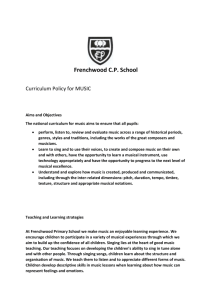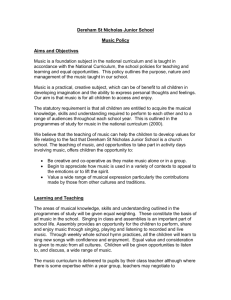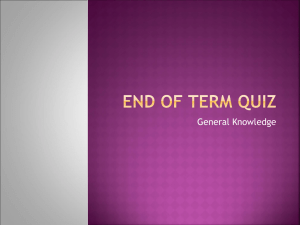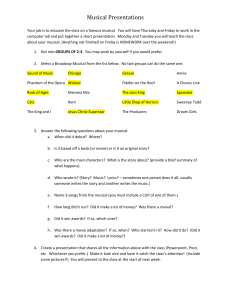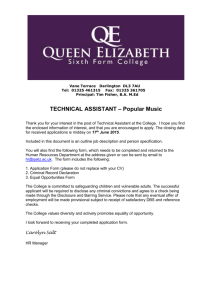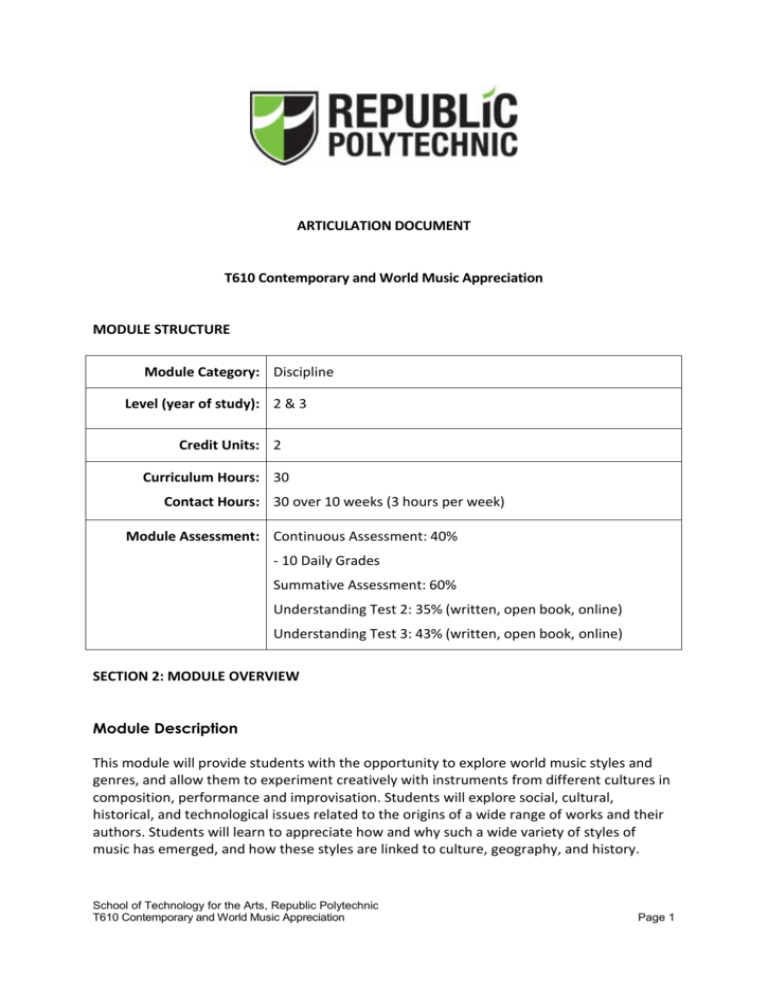
ARTICULATION DOCUMENT
T610 Contemporary and World Music Appreciation
MODULE STRUCTURE
Module Category: Discipline
Level (year of study): 2 & 3
Credit Units: 2
Curriculum Hours: 30
Contact Hours: 30 over 10 weeks (3 hours per week)
Module Assessment: Continuous Assessment: 40%
- 10 Daily Grades
Summative Assessment: 60%
Understanding Test 2: 35% (written, open book, online)
Understanding Test 3: 43% (written, open book, online)
SECTION 2: MODULE OVERVIEW
Module Description
This module will provide students with the opportunity to explore world music styles and
genres, and allow them to experiment creatively with instruments from different cultures in
composition, performance and improvisation. Students will explore social, cultural,
historical, and technological issues related to the origins of a wide range of works and their
authors. Students will learn to appreciate how and why such a wide variety of styles of
music has emerged, and how these styles are linked to culture, geography, and history.
School of Technology for the Arts, Republic Polytechnic
T610 Contemporary and World Music Appreciation
Page 1
Module Coverage
Explore the origins of the following genres and styles of music with a stronger
focus on South East Asian music:
-
Sacred music
Dance
Jazz
Theatre
Practical Lessons will cover the anatomy, aural characteristics and basic
applications of the following instruments:
Djembe (related to sacred music and dance)
Gamelan (related to ceremonial, dance and theatre)
Ukulele (guitars may also be provided, developing an understanding of
string instruments, related to Jazz. The Ukulele is an accessible instrument. It is
cheap and easy to play.
MODULE OUTCOMES AND LEARNING OUTCOMES
Learning Outcome
At the end of this module, students will be able to:
1. Identify characteristics of selected musical genres and styles and
instruments from around the world
2. Discuss and analyse various musical genres such as: (i) sacred music, (ii)
dance music, (iii) Jazz, and (iv) music of traditional and contemporary
theatre
3. Use appropriate terminology when describing these various genres of
music from around the world
4. Explain how the development of various musical styles are linked to
culture, geography and history
5. Apply the knowledge of contemporary and world music in other
modules within their diploma as well as in their own creative and
professional work
The module will encourage students to ask why are things the way they are,
and be critical of their own creative output from a historical and
contemporary perspective.
School of Technology for the Arts, Republic Polytechnic
T610 Contemporary and World Music Appreciation
Page 2
Module Structure
1.
The overarching framework of the new T360 module will follow two
formats, “Lecture-Research” (LR) and “Practical-Lab” (PL). Both formats
aim for a high level of engagement in the learning environment.
The lesson will be sequenced as:
2.
P1
LR
P2
PL
P3
LR
P4
PL
P5
LR
P6
PL
P7
P8
LR
LR
P9
LR
P10
Summative
seminar &
Discussion
on Fusion
music
Allocated time per day
Module Coverage
Discussions in
Study Cluster
Resource
gathering
and team
work
Skills acquisition
and practice
Week 1: Definitions of World Music
a) Explain how the
development of various
musical styles are linked to
culture, geography and
history.
b) Use appropriate terminology
when describing these
various genres of music from
around the world.
60 mins
60 mins
60 mins
60 mins
60 mins
60 mins
c) Identify music of various
cultures.
Week 2: Practice Studio
a) Identify characteristics of
selected musical genres and
styles and instruments from
around the world.
b) Classify musical instruments
of various cultures.
School of Technology for the Arts, Republic Polytechnic
T610 Contemporary and World Music Appreciation
Page 3
Week 3: Sacred Music
a) Use appropriate terminology
when describing various
genres of music
b) Describe how the
development of selected
musical genres is a result of
cultural, geographical and
historical forces.
c) Explain the social – historical
origins and their influences
on contemporary musical
practices.
Week 4: Instrumental Practice:
Gamelan Performance
a) Describe how the
development of Gamelan
music in context of cultural,
30 mins
geographical and historical
forces.
b) Use appropriate terminology
when describing Gamelan
music.
Week 5: Dance
a) Describe how the
development of selected
musical genres are a result of
cultural, geographical and
60 mins
historical forces.
b) Explain the social – historical
origins and their influences
on contemporary musical
practices.
Week 6: Instrumental Practice:
Music and Movement
a) Explain the social – historical
origins and their influences
on contemporary musical
practices
60mins
b) Infuse into their creative and
professional work, stylistic
traits of the various musical
genres.
School of Technology for the Arts, Republic Polytechnic
T610 Contemporary and World Music Appreciation
2.5 hrs
120mins
90mins
30mins
Page 4
Week 7: Music in the Sub-Sahara
Africa
a) Be able to describe the
general characteristics of
African music
b) Be able to explain purposes
of music in African societies
c) Be able to identify the
60mins
African musical instruments
d) Be able to justify the design
of African music instruments
in relation to their lifestyles
e) Be able to outline the
influence African music has
on the development of
contemporary music
Week 8: Blues and Jazz
a) Be able to aurally recognize
Blues as a musical form and
musical genre;
b) Be able to discuss to the
origin and evolution of Blues
as a musical genre and form;
c) Be able to discuss the culture
responsible for
“popularizing” the musical
form;
d) Be able to discuss the early
function of Blues;
e) Be able to identify sub60mins
genres of Blues aurally and
through discussion of key
Blues musicians;
f) Be able to create a simple
Blues influence performance
via call-and-response;
g) Be able to discuss the
common instrumentations in
a contemporary Blues
performance;
h) Be able to discuss the
evolution of instrumentation
in Blues ensemble.
Week 9: Musical Theatre
i) Be able to discuss of the
60mins
evolution of traditional Asian
School of Technology for the Arts, Republic Polytechnic
T610 Contemporary and World Music Appreciation
120mins
60mins
60mins
60mins
60mins
Page 5
music theatre from early
days’ such as Wayang Kulit,
Chinese opera & Japanese
Noh, to modern productions.
j) Be able to identify key
components of
contemporary musical
theater e.g. songs, spoken
dialogue, dance and acting;
k) Be able to outline the
development of musical
theater in the western
culture, including its golden
age (mid 1930’s – 60’s)
l) Be able to discuss the
adaptation of classic
literature or use of social
themes in modern musical
productions.
Week 10: Module Revision
a) Define the musical genres
that constitute World Music
and Contemporary music.
b) Use appropriate terminology
when describing various
genres of music
c) Describe
how
the 30mins
development of selected
musical genres are a result of
cultural, geographical and
historical forces.
120mins
30mins
d) Explain the social – historical
origins and their influences
on contemporary musical
practices.
Total = 10 Problems = 30 hours
TEACHING AND LEARNING
The module is designed with some topics to coincide with logistic and technical
management in support of live sound reinforcement job scope. In topic 2 - world
instrument classification and performance requirement, students were tasked to
propose a live sound reinforcement plan in support of a world music ensemble.
School of Technology for the Arts, Republic Polytechnic
T610 Contemporary and World Music Appreciation
Page 6
In doing so, they had to extend their understanding of instrumental properties and
reason their proposal. Similarly in topic 6, practical session on music and movement
allowed a better understanding on staging requirement for a world music and
movement performance.
The module is predominantly delivered via an interactive seminar, style curriculum. However,
up to 15% of the module uses an interactive seminar style curriculum. The module is
predominantly taught in a classroom and also involves practicums.
LEARNING RESOURCES
Reading List and Resources
Contemporary and World Music Appreciation
Main text resources:
Fletcher, P. (2004). World musics in context: A comprehensive survey of the world's major musical
cultures. New York: Oxford University Press.
Nettl, B. (2008). Excursions in world music (5th ed.). NJ: Pearson Prentice Hall.
School of Technology for the Arts, Republic Polytechnic
T610 Contemporary and World Music Appreciation
Page 7


